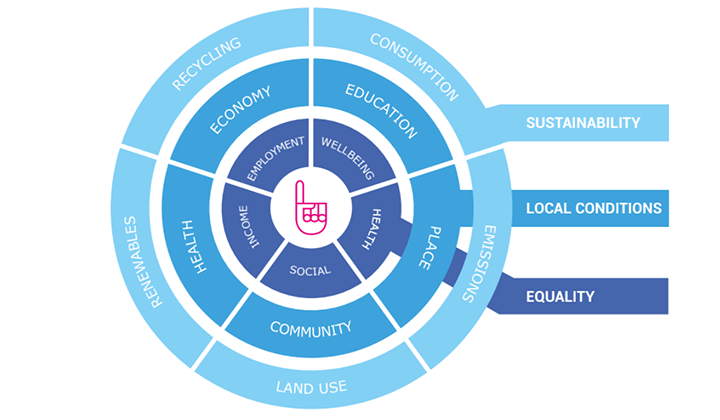A famous management thinker, Peter Drucker, is often quoted as saying “You can’t manage what you don’t measure” — meaning that without tracking success and failure, we can’t improve. With social issues, measurement can be difficult, but U.K. organization Happy City has developed a solution: a tool called the Thriving Places Index. The tool measures wellbeing in cities creating scorecards that can be compared across metrics. The tool measures through three unique lenses: equality, sustainability, and local conditions.
Rather than focusing on economic measures of development and success, the Thriving Places Index measures on the basis of social needs. Each of the three frameworks draws on a variety of factors. The “local conditions measure” details drivers of individual wellbeing, like access to green space, education and affordable housing. The “sustainability measure” considers environmental actions like land use, emissions, and recycling, while the “equality measure” assesses income disparity, social mobility, and access to healthcare among others. The result is a detailed scorecard that can help residents, planners and city leaders to understand what they are doing well to support their community, and where they can improve.
Traditional measures of development, like Gross Domestic Product measure economic growth but ignore the social implications of that growth, disguising inequality and income disparity. The Thriving Places Index aims to reverse the trend by starting with social measures as a core component of success.
The Index is currently available for 373 areas in England and Wales and is continuing to grow. The raw data comes from a variety of sources, including the U.K.’s National Office of Statistics. It is meant to serve as an accessible resource that can be used as cities attempt to innovate and solve social challenges, and to change the definition of success as tied to consumption of resources and economic growth.
“It is with the purpose of government, business and all of human endeavour, which is not to consume more stuff and grow wealth, but to grow our capacity to thrive,” wrote Liz Zeidler, chief executive of Happy City, in the organization’s annual report on the Index. “Until we focus on that goal and measure our progress against that, we will continue to strive for, and deliver the wrong outcomes – including ever-rising levels of inequality and injustice, and the increasingly visible and devastating consequences of climate change.”









